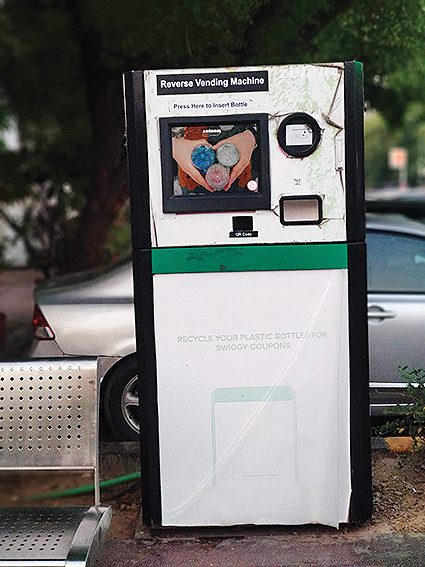Recycling bins which are supposed to give rewards in return for bottles are a non-starter in connaught place
The dry waste collection machines installed two years ago by NDMC in places like Connaught Place and India Gate are a non-starter. An expert on waste management calls it an initiative which will not tackle even 1% of the solid waste problem
Remember the time when those sleek charging panels were installed in Connaught Place, the city’s go-to spot for shopping or chilling. These charging panels turned out to be a saviour for the general public in the hour of need. This initiative was started by NDMC (New Delhi Municipal Corporation), and was appreciated by the public for its utility.
When one looks at the 2-year-old machines for recyclable plastic installed by NDMC under the Smart City project, one would assume that it’s being appreciated by the public. However, the reality is far from the vision with which NDMC installed these machines.
The machines offer monetary rewards to persons who will put in a plastic bottle, glass bottle or a tin/can — in short, recyclable waste. However, this ‘payment’ gets transferred only to an e-wallet. The chances of all the people using the same wallet service is nothing but wishful thinking. It also, makes the reward idea a non-starter.
A weekday evening in Connaught Place sees a lot of shoppers and consequently a lot of waste being generated. Some throw disposable cutlery and some throw plastic bottles. However, these things do not end up in the smart machines, but in regular dustbins.
Patriot tried using the machine to dispose of a plastic water bottle. The process is as tedious as it can get. The machine is badly designed. So much so that it confuses the person standing in front of it, and demands a good 30 seconds of observation, to understand the process.
Although it has designated insertion points for e-waste & wrappers, degradable waste, but the information is not adequate for a person to decide the right insertion point.
We tried putting one bottle in the designated point, and after a few seconds the screen did nothing but show that the bottle has been taken. Right after, the barcode point flashed for a few seconds, but the machine doesn’t provide instructions for this step. Actually, you are supposed to scan the barcode before inserting the bottle.
Nonetheless, we waited for the screen to show some result. It did, only to show it was refreshed. Which means the process was over and it was ready for another piece of trash.
Neither did the money come, nor did any message. Strolling through the inner circle of the market, we found at least five such machines. But are there any takers for it? Keeping watch for some time, we did not see a single user going to the machine or even looking at it.
The machine only came to the notice of the public when we tried to stop amid the crowd to take a picture. Even if attendants had been appointed to stand by and assist users, the initiative could have taken off.
Asked about the scheme, an expert was scathing in her criticism. “Last when I checked, those machines were not even working,” says Swati Singh Sambyal, Programme Manager, Waste Management at Centre for Science and Environment.
“The entire idea was to ensure that bottles are collected and go for recycling. One issue is the operational feasibility of these machines. If you go and check, in a lot of places in CP itself they’re not working. In the informal sector, by contrast, collecting recyclable plastic and then channelising it is very active. So once you take an initiative like this, you also cut into the rights of an informal ragpicker,” says Sambyal.
She also says, “Installation of this machine, which would cost easily a Rs 1 lakh, snatches the the right of the informal sector. An informal worker would have made some money out of it for himself,” she says.
Sambyal has many revelations about the recycling market, 90-95% of which is still informal in nature. “This means there are a lot of illegal units running which make palettes out of various plastic products. These are sold to various industries where they could make a bucket out of those palettes,” she tells.
She says that units of such kinds are running unregulated in the industrial areas of Palam, Mundka and Bawana. According to her, the supervision and monitoring of these units is really hard. The entire debate on recycling, she says, is “on how green is it? How clean is it? Because it is polluting and it does contribute to air pollution and water contamination,” she tells.
According to Sambyal, “The challenge in Delhi is that they’re still doing pilots on waste management. Whereas the time of pilots is over and we need action now.” She continues, “You can’t wait for two-three years to see what works and meanwhile keep dumping and burning. It’s time for action.”
The NDMC initiative, she says, is for a very niche plastic. “Non-recyclable plastic is mostly generated from food packets, used diapers, packaging for online food orders. So these machines are good only when you’re on the road or shopping.”
So what’s her verdict? Do these machines in any way tackle the problem of waste? Sambyal gives no quarter. “It won’t even deal with 1% of the problem right now,” she concludes.
As per the Central Pollution Control Board (CPCB), about 1.43 lakh tonne of municipal solid waste (MSW) is generated across the country in a day. Some 1.11 lakh tonne per day (TPD) is collected and only 35,602 TPD is recycled. A vast deficit.





